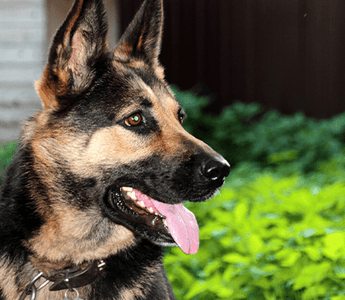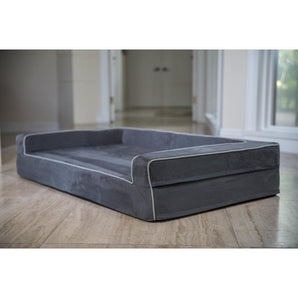German shepherds are one of the most recognizable and iconic dog breeds in the world. It's not hard to see why. Their striking physique, with their muscular builds and pointed ears, makes them a truly beautiful dog.
They are also among the most popular dog breeds in the world. But despite this popularity, some concern remains as to just how safe shepherds are in a household.
Many apartments and other rental properties outright ban tenants from owning German Shepherds. Are these fears warranted? Are German Shepherds aggressive? Or are they a great pet? Let's take a look.
A Brief Overview of German Shepherds
Before we get into the temperament and behavior of German Shepherds, let's look at their physical aspects first.
German Shepherds are considered large dogs. Their average height is two feet, give or take a few inches. They usually weigh between 60 and 70 pounds, but male Shepherds can weigh as much as 90 pounds.
As their name would suggest, Shepherds were originally herding animals. They were and still are used to herd livestock. Because of this, Shepherds are fast, athletic, and energetic.
German Shepherds are also highly intelligent dogs. This makes them easy to train, and able to learn many more commands than other dog breeds.
Their unique mixture of intelligence and athleticism is part of why Shepherds are used as guard and police dogs. However, they are not an inherently aggressive breed, and they can make for great family companions.

Are German Shepherds Good Household Pets?
Given the outdoorsy and energetic nature of German Shepherds, you may be wondering if they can make good household pets.
The answer to this is yes, they can. But it’s vital for them to receive proper training and treatment.
German Shepherds are a very friendly and loving dog. The breed is renowned for its loyalty, and this loyalty extends to their humans as well. German Shepherds love to spend time with their people.
Shepherds are also extremely intelligent dogs and extremely fast learners.
Because of their intelligence, Shepherds can learn a variety of commands. However, they can be somewhat stubborn if activity remains low. Long periods of restlessness and boredom can result in your Shepherd chewing, digging, and misbehaving.
This is why it's important to begin training them from a young age. And why we recommend a chew-proof dog bed that will last them a lifetime.
A popular question many consider before bringing this breed into their household is “Do German Shepherds shed?”
Yes, they do. German Shepherds will constantly shed throughout the year, with the bulk of their shedding coming during the changing of seasons in the spring and winter.
This will require you to brush as often as possible so that their hair doesn’t mat and tangle.
One way to help combat the high amount of shedding is to give them plenty of time outdoors for regular exercise and playtime.
Shepherds love to be outside and love to run. Activities that allow them to do so will help keep the dog happy.
And as social dogs, they will want to spend a lot of time around you. Shepherds will generally try to stay close to you when in the house as much as possible.
Are German Shepherds Good With Kids?
A common concern with German Shepherds and other large dog breeds is their interactions with children. Many parents fear that the dog may be aggressive.
Thankfully, German Shepherds are good with kids.
Shepherds are naturally friendly, and this tendency makes them unlikely to be aggressive. They are also patient, which means they are less likely to lose their temper with young children.
Most issues between children and dogs come down to misunderstandings between the two. Teaching your child how to interact with the dog, and vice versa, will go a long way towards preventing accidents.
Still, there are a few things to keep in mind. Shepherds are lickers, and will often do so to show affection. A Shepherd may want to lick a child's face as a loving gesture. But the child may misunderstand this and grow afraid.
Similarly, because of their athletic nature, Shepherds have a tendency to jump when excited. This can lead to accidents where the dog may jump into a child and knock it over.
Luckily, both of these issues can be eliminated by training your dog from a young age. Since Shepherds are highly intelligent dogs, this training is easier than it may be for other dog breeds.

How Healthy Are German Shepherds?
One major concern for prospective German Shepherd owners is their health. Larger dogs have a tendency to be more prone to health issues, particularly regarding their bones and joints. Are Shepherds similarly unhealthy?
Relative to their size, German Shepherds are generally a healthy dog breed. They are not as prone to chronic health issues as other dog breeds, such as Huskies or Shih Tzus.
However, this doesn't mean Shepherds are without health concerns. Because they're larger dogs, they are still susceptible to many of the same health problems of other breeds.
Like most larger dog breeds, German Shepherds are prone to heart conditions and hip dysplasia. Heart murmurs are particularly common among Shepherds.
Dysplasia is another health problem that many Shepherds can suffer from in old age. Hip dysplasia is the most common, but it can also affect the dog's elbows as well. Dysplasia is a chronic condition that can lead to other issues later in life, such as arthritis.
Because of their tendency for joint problems, it's important to take care of your dog's bones. Joint support chews and other supplements can reduce the risk of arthritis and dysplasia.
Shepherds are also uniquely prone to digestive issues. Gastric bloat is especially common among German Shepherds. Gastric bloat occurs when the dog's stomach becomes distended and then twists.
Gastric bloat can be fatal if not treated quickly. To mitigate the risk, Shepherds should be fed multiple smaller meals per day rather than one large meal. They should also not be allowed to exercise immediately after eating.
Shepherds can also suffer from pancreatic issues, as well as chronic issues with diarrhea and vomiting. Still, they have fewer chronic health issues than many other large dog breeds, and many of the ones they do have can be easily treated.
Where Do German Shepherds Get Their Reputation?
If German Shepherds are such good, friendly dogs, where do the fears of aggression come from? Why are Shepherds not allowed in many apartments, condos, and other rental properties?
The issue often comes from the way the dog is kept and trained. While Shepherds are not inherently aggressive dogs, they can be if they are not properly cared for.
Shepherds are smart and extremely energetic. If they are not allowed regular opportunities to play and exercise, they can grow restless and anxious. This anxiety can cause aggressive behavior that the dog may not otherwise exhibit.
It's for that reason that apartments and condos tend not to allow Shepherds. They simply do not have to room to accommodate the needs of a German Shepherd on their property.
Avoiding aggression largely comes down to preventing this restlessness and anxiety. Proper exercise and play will keep your dog happy and healthy. This will make them unlikely to be aggressive.
If your dog is prone to anxiety, like some dogs are, they can also be treated with anxiety treats. When combined with regular exercise and play, they will keep your dog happy, friendly, and healthy.
Most issues with aggressive dogs stem from a misunderstanding of the dog's needs. German Shepherds need a lot of play, exercise, and socializing in order to stay happy and healthy.
If these needs are met, your Shepherd shouldn't display aggressive behavior. Instead, you'll find a loving and friendly companion for your home.
Conclusion: German Shepherds Can Be Excellent Pets
Like many large dogs, German Shepherds have an unfortunate reputation for being aggressive breeds. With proper care and training, Shepherds can make for gentle and loving canines.
They are great companions to exercise with due to their high energy and playfulness, their intelligence makes them easy to train (and a popular breed to serve as a service dog), and they display a normal, well-behaved temperament around children.
The key is to train, exercise, and socialize your German Shepherd on a consistent basis to prevent them from getting bored and destructive.
The most important thing is to determine how much time you’re able to spend caring for this dog. If can’t dedicate a chunk of your time to this breed each day, a German Shepherd may not be for you.
But if you can, and are excited to add a German Shepherd to your household, we suggest investing in a chew-proof dog bed, joint support chews, and anxiety treats to provide a happier, healthier, lifestyle for the newest member of your family.







